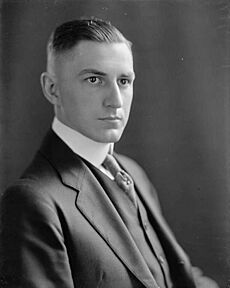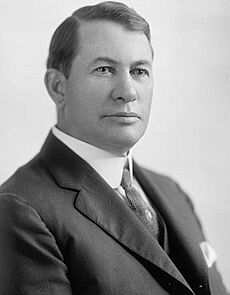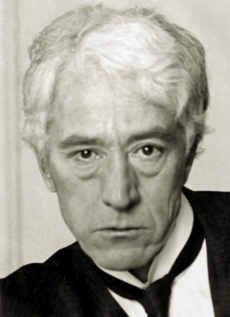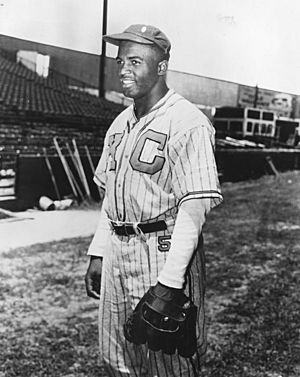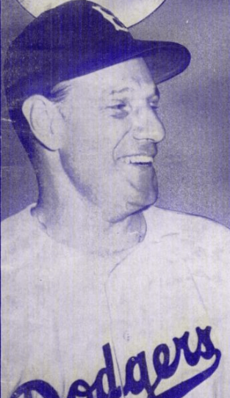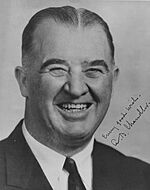Happy Chandler facts for kids
Quick facts for kids
Happy Chandler
|
|
|---|---|
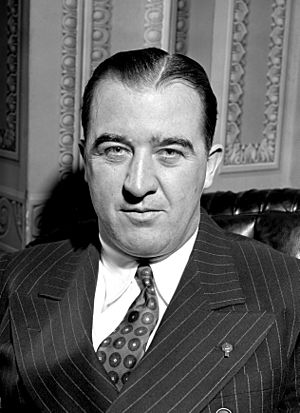
Chandler in 1940
|
|
| 44th and 49th Governor of Kentucky | |
| In office December 13, 1955 – December 8, 1959 |
|
| Lieutenant | Harry Lee Waterfield |
| Preceded by | Lawrence Wetherby |
| Succeeded by | Bert Combs |
| In office December 10, 1935 – October 9, 1939 |
|
| Lieutenant | Keen Johnson |
| Preceded by | Ruby Laffoon |
| Succeeded by | Keen Johnson |
| 2nd Commissioner of Baseball | |
| In office November 1, 1945 – July 15, 1951 |
|
| Preceded by | Kenesaw Mountain Landis |
| Succeeded by | Ford Frick |
| United States Senator from Kentucky |
|
| In office October 10, 1939 – November 1, 1945 |
|
| Preceded by | M. M. Logan |
| Succeeded by | William A. Stanfill |
| 36th Lieutenant Governor of Kentucky | |
| In office December 8, 1931 – December 10, 1935 |
|
| Governor | Ruby Laffoon |
| Preceded by | James Breathitt Jr. |
| Succeeded by | Keen Johnson |
| Member of the Kentucky Senate from the 22nd district |
|
| In office January 8, 1929 – December 8, 1931 |
|
| Personal details | |
| Born |
Albert Benjamin Chandler
July 14, 1898 Corydon, Kentucky, U.S. |
| Died | June 15, 1991 (aged 92) Versailles, Kentucky, U.S. |
| Resting place | Pisgah Presbyterian Cemetery, Versailles, Kentucky |
| Political party | Democratic |
| Spouse |
Mildred Lucille Watkins
(m. 1925) |
| Children | 4 |
| Relatives | Ben Chandler (grandson) |
| Alma mater | Transylvania University Harvard University University of Kentucky |
| Occupation |
|
| Signature | |
| Military service | |
| Allegiance | United States |
| Branch/service | United States Army |
| Years of service | 1918–1919 |
| Battles/wars | World War I |
|
Baseball career |
|
| Induction | 1982 |
| Election Method | Veterans Committee |
Albert Benjamin "Happy" Chandler Sr. (born July 14, 1898 – died June 15, 1991) was an important American politician from Kentucky. He served Kentucky as a U.S. Senator and was its governor twice. Beyond politics, he was the second Commissioner of Baseball from 1945 to 1951. He was honored for his work in baseball by being inducted into the Baseball Hall of Fame in 1982. His grandson, Ben Chandler, also became a congressman for Kentucky.
Contents
Early Life and Education
Albert Benjamin Chandler was born in Corydon, Kentucky, in 1898. He was the oldest child of Joseph Sweet and Callie (Saunders) Chandler. He was raised by his father and other relatives. By age 8, he earned his own money by delivering newspapers and doing odd jobs.
In 1917, he graduated from Corydon High School. He was the captain of both the baseball and football teams. His father wanted him to become a minister. However, Chandler chose to attend Transylvania College (now Transylvania University) in Lexington, Kentucky. There, he earned his famous nickname "Happy" because he was always so cheerful. He paid for his college by doing chores for people in the community.
Chandler was a talented athlete at Transylvania. He captained the basketball and baseball teams and was the quarterback for the football team. He also joined the Pi Kappa Alpha fraternity. During World War I in 1918, he trained to be an officer in the United States Army. However, the war ended before he was called to active duty.
In 1920, Chandler played baseball for a team in North Dakota. He even pitched a no-hitter. He tried out for a professional baseball team but did not make it. He returned to Transylvania and earned his Bachelor of Arts degree in 1921. He then played for a Class D baseball team, the Lexington Reds. He thought about a career in baseball but decided to study law instead.
He started at Harvard Law School in 1921. He paid for his studies by coaching high school sports. After a year, he could not afford Harvard anymore. He returned to Kentucky and continued his law studies at the University of Kentucky College of Law. He also coached high school sports and was an assistant coach at Centre College. In 1924, he earned his law degree. He became a lawyer in 1925 and opened his own practice in Versailles.
On November 12, 1925, Chandler married Mildred Lucille Watkins. She was a teacher. They had four children together. For five years, Chandler worked as a lawyer, coached sports, and scouted for Centre College. He also joined several community groups.
Starting in Politics
Chandler began his political career as the head of the Democratic Committee in Woodford County, Kentucky. In 1928, he was appointed a commissioner for the Woodford County court. The next year, he was elected as a Democrat to the Kentucky Senate.
In 1931, Chandler ran for lieutenant governor. He was supported by several important political leaders. He was elected with Ruby Laffoon as governor. Chandler won against John C. Worsham. He received 426,247 votes to Worsham's 353,573. Breaking tradition, Chandler set up his office in the Kentucky State Capitol and worked there full-time. Previous lieutenant governors usually only stayed in Frankfort during legislative sessions.
Soon after they were elected, Chandler and Governor Laffoon disagreed. Laffoon wanted to start a state sales tax, but Chandler was against it. As the leader of the State Senate, Chandler worked to stop the tax. In response, Laffoon's allies in the Kentucky General Assembly took away some of Chandler's powers. The tax then passed by a very small number of votes.
Chandler wanted to become governor after Laffoon. Laffoon wanted Thomas Rhea to be his successor. Chandler worried that Laffoon would choose the next candidate without a public vote. So, when Laffoon left the state, making Chandler acting governor, Chandler called the legislature into a special meeting. He pushed for a law that would require parties to choose their candidates through a primary election. This bill passed, and Chandler later defeated Laffoon's choice, Thomas Rhea, in the primary.
First Term as Governor (1935–1939)
Chandler promised to get rid of the unpopular sales tax. He also promised to lower the gasoline tax and not raise property taxes. He also wanted to stop the practice of state employees having to donate part of their salaries to political campaigns. Laffoon and his supporters were angry and backed the Republican candidate, King Swope.
Chandler defeated Swope in the general election. He won with 556,262 votes (54%) to Swope's 461,104 (45%). This 95,000-vote difference was the largest victory margin for a Kentucky governor at that time. At 37, Chandler was also the youngest governor in any U.S. state.
One of Chandler's first actions was to repeal the sales tax. He also got the legislature to change the primary election system back to a single round. To make up for the lost sales tax money, Chandler raised excise taxes, especially on whiskey. He also introduced Kentucky's first income tax.
Chandler also reorganized the state government with the Governmental Reorganization Act of 1936. This law saved a lot of money by reducing the number of state boards and commissions from 133 to 22. Critics said this gave the governor more power.
He used the money saved to pay off most of the state's debt. These savings were then used to improve Kentucky's roads and schools. Chandler provided free textbooks for students and created a pension fund for teachers. He also gave money to help black students attend graduate schools outside the state, as segregation prevented them from attending in Kentucky.
In 1936, Chandler started Kentucky's first rural roads program. He also helped develop electricity in rural areas with federal help. He expanded programs for the elderly and proposed adding dependent children and blind people to state assistance. He increased funding for state hospitals.
Chandler generally supported organized labor. He supported miners' efforts to form unions and created the state Department of Industrial Relations. He also backed a state law against child labor. However, he used the Kentucky National Guard to stop labor violence in Harlan County.
Serving as a U.S. Senator
Chandler believed he could become President of the United States. In 1938, he challenged Alben Barkley for his U.S. Senate seat. President Franklin D. Roosevelt came to Kentucky to support Barkley. Chandler lost this close race.
The next year, Kentucky's other senator, Marvel Mills Logan, passed away. Chandler resigned as governor so his successor could appoint him to the empty Senate seat. On October 10, 1939, Governor Keen Johnson appointed Chandler to the Senate. In a special election in 1940, Chandler won the seat.
As a senator, Chandler was a fiscal conservative. He disagreed with some parts of Roosevelt's New Deal. He also openly disagreed with the president's decision to focus on the war in Europe over the war in the Pacific during World War II.
In 1942, Chandler ran for re-election. He won against John Y. Brown Sr. in the Democratic primary and Richard J. Colbert in the general election.
Baseball Commissioner (1945–1951)
After Baseball Commissioner Kenesaw Mountain Landis died in 1944, Chandler was suggested as his replacement. As a senator, Chandler had supported baseball during the war. This made him popular with team owners. The commissioner's salary was also much higher than a senator's.
Chandler was elected Commissioner of Baseball on April 24, 1945. He stayed in the Senate for a few more months to vote on important international agreements. He officially became commissioner on November 1, 1945. His election was not popular with all the press, who sometimes called him "the Kentucky windbag."
In 1946, a league in Mexico tried to attract American baseball players with high salaries. Chandler stopped this by banning any player who went to the Mexican League for five years. Eighteen players were banned, but this action helped protect Major League Baseball.
Breaking Baseball's Color Line
One of Chandler's most important actions was approving Jackie Robinson's contract with the Brooklyn Dodgers. This decision effectively ended the racial segregation in Major League Baseball. Chandler had the power to stop Robinson from playing, but he chose to approve it.
In 1947, when Robinson faced racial taunting from the Philadelphia Phillies, Chandler threatened the team and their manager with punishment. Later that season, he supported a decision to suspend any members of the St. Louis Cardinals who threatened to strike against racial integration. Chandler's support was crucial in allowing Jackie Robinson to play.
Other Important Actions
In 1947, Chandler sold the rights to broadcast the World Series on the radio for $475,000. He used this money to create the first pension fund for baseball players. In 1949 and 1950, he negotiated more deals for radio and television broadcasts of the Series. The money from these deals, totaling millions of dollars, also went directly into the pension fund. This earned him the nickname "the players' commissioner."
In 1949, a player named Danny Gardella sued Major League Baseball. He claimed Chandler's ban on players who went to Mexico was unfair. To ease the legal pressure, Chandler lifted the bans on players who had gone to Mexico.
Chandler's contract as commissioner was not renewed in 1951. He resigned on July 15, 1951. After his time as commissioner, Chandler returned to his law practice and farming. He also published a newspaper.
Second Term as Governor (1955–1959)
Chandler stayed involved in politics. In 1955, he ran for governor again, using the slogan "Be like your Pappy and vote for Happy." He won the Democratic primary and then defeated Republican Edwin R. Denney in the general election. He received 451,647 votes (58%) to Denney's 322,671 (41%). This was the largest margin of victory for a governor in Kentucky at that time.
As governor, Chandler faced the challenge of funding state programs. He cut some programs but also raised taxes on things like whiskey and added a surtax on income taxes. He also proposed a $100 million bond issue to fund universities and highways.
Chandler often had to work with Republican lawmakers to pass his plans. He would promise to build or fix roads in Republican areas in exchange for their support.
One of his proudest achievements was funding a medical school at the University of Kentucky. He allocated $5 million for its establishment. This became known as the Albert B. Chandler Medical Center.
Chandler also dealt with racial integration during his second term. He issued an order ensuring equal access to state parks for everyone. He publicly supported the US Supreme Court's 1954 decision in Brown v. Board of Education, which outlawed segregation in schools. When some areas resisted, like Sturgis, Kentucky, in 1956, Chandler called out the Kentucky National Guard to ensure black students could attend school. He took similar action in Clay. He stated, "We regret it is necessary to use this means of guaranteeing equal rights to our citizens, but that we must do."
In 1956, Chandler sought the Democratic presidential nomination but did not succeed. In the 1959 gubernatorial primary, Chandler supported Harry Lee Waterfield. However, Bert T. Combs won the primary and later the general election.
Later Life and Legacy
In 1957, Chandler was one of the first ten people inducted into the Kentucky Sports Hall of Fame. He continued to be involved in sports, leading the International Baseball Conference from 1952 to 1955.
He ran for governor unsuccessfully three more times, in 1963, 1967, and 1971. Even after these losses, he remained somewhat influential in state politics.
The Major League Baseball Veterans Committee chose Chandler for induction into the Baseball Hall of Fame in 1982. In 1987, he supported Wallace G. Wilkinson in the Democratic primary, which was important for Wilkinson's victory.
Chandler published his autobiography, Heroes, Plain Folks, and Skunks, in 1989. He passed away in Versailles on June 15, 1991, at the age of 92. At the time of his death, he was the oldest living member of the Baseball Hall of Fame and the longest-living former Kentucky governor.
Images for kids


